2018年12月4日(火)に、上智大学経済学部の本田文子准教授を講師にお迎えして、定例研究会を開催し、セネガルの医療従事者を対象とした調査の結果を報告いただきました。
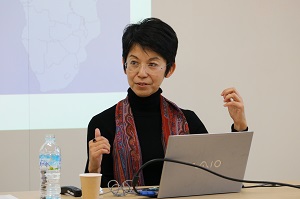 | 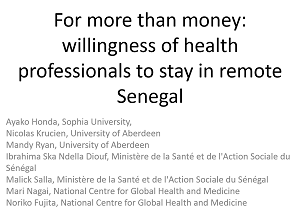 | 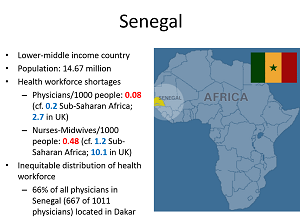 |
| 講演中の本田文子准教授 | 報告スライドから | |
 | 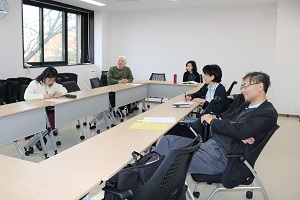 | 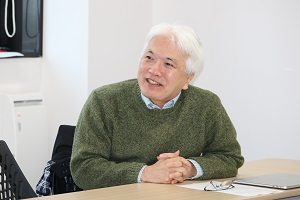 |
| コメントをする井伊教授 (HIAS Health 研究員) | 会場の様子 | コメントをする山重教授 (HIAS Health 研究員) |
本田文子先生略歴
専門は保健・医療の経済学。近年は、サブサハラ・アフリカと東南アジアを中心に研究を行う。医療費の財源、サービスへのアクセス、医療従事者のインセンティブとモチベ ーション等、多くの国で生じている保健・医療に関するさまざまな課題について、経済学を含む社会科学の分析枠組みや手法を用いて解き明かし、取り組みについて考える 研究に従事。2009年から2017年まで、南アフリカのケープタウン大学に勤務。アフリカ、アジアの研究者、行政官、NGO等、さまざまな立場の同僚と協働を続けている。
-------
| 日時 | 2018年12月4日(火)10:30-12:00 |
| 会場 | 西キャンパス 第2研究館 5階 HIASセミナー室(517号室) |
| 報告者 | 本田文子准教授、上智大学経済学部経済学科 |
| タイトル | 「For more than money: willingness of health professionals to stay in remote Senegal」 |
| 言語 | 日本語(ただし、発表スライドは英語です) |
| 概要 | Background Poor distribution of already inadequate numbers of health professionals seriously constrains equitable access to health services in low- and middle-income countries. The Senegalese Government is currently developing policy to encourage health professionals to remain in areas defined as ‘difficult’. Understanding health professional’s preferences is crucial for this policy development. Methods Working with the Senegalese Government, a choice experiment (CE) was developed to elicit the job preferences of physicians and non-physicians. Attributes were defined using a novel mixed-methods approach, combining interviews and Best-Worst Scaling (Case 1). Six attributes resulted, categorised as ‘individual (extrinsic) incentive’ (‘type of contract’, ‘provision of training opportunities’, ‘provision of an allowance’, and ‘provision of accommodation’) or ‘functioning health system’ (‘availability of basic equipment in health facilities’ and ‘provision of supportive supervision by health administrators’) attributes. Using face-to-face interviews, the CE was administered to 55 physicians (3,909 observations) and 246 non-physicians (17,961 observations) randomly selected from those working in eight ‘difficult’ regions in Senegal. Conditional logit was used to analyse responses. This is the first CE to both explore the impact of contract type on rural retention and to estimate value of attributes in terms of willingness-to-stay (WTS) in current rural post. Results For both physicians and non-physicians, a permanent contract is the most important determinant of rural job retention, followed by availability of equipment and provision of training opportunities. Relative importance of an allowance is low, suggesting health professionals value stability in employment more than financial incentives. Retention probabilities suggest policy reform affecting only a single attribute is unlikely to encourage health professionals to remain in ‘difficult’ regions. Conclusion Contract type was a key factor impacting on retention; relative importance of a financial allowance is low. This has led the Senegalese Health Ministry to introduce a new rural assignment policy that recruits permanent staff from the pool of annually contracted healthcare professionals on the condition they take up rural posts. While this is a useful policy development, further effort, considering both personal incentives and the functioning of health systems, is necessary to ensure health worker numbers are adequate to meet the needs of rural communities. Authors: Ayako Honda, Sophia University, Tokyo, Japan Nicolas Krucien, University of Aberdeen, Aberdeen, the United Kingdom Mandy Ryan, University of Aberdeen, Aberdeen, the United Kingdom Ibrahima Ska Ndella Diouf, Ministère de la Santé et de l'Action Sociale du Sénégal, Dakar, Senegal Malick Salla, Ministère de la Santé et de l'Action Sociale du Sénégal, Dakar, Senegal Mari Nagai, National Centre for Global Health and Medicine, Tokyo, Japan Noriko Fujita, National Centre for Global Health and Medicine, Tokyo, Japan |

